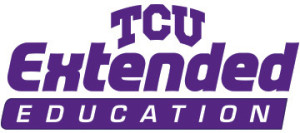JAVA Track
JAVA TRACK
Java Badge Level 1 — Programming Basics (two months-$2,000)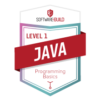
Section A. Basics (60 hours)
This section introduces core Java syntax and other fundamentals. Learn to set up and run a basic Java development environment on an Ubuntu operating system. Also, run simple tasks in a NetBeans environment and explore Atlassian project management tools.
Section B. Classes and Objects (60 hours)
Explore fundamentals of object-oriented programming. Create Java classes using inheritance and polymorphism, and test code using JUnit test framework.
Java Badge Level 2 — Object-Oriented Programming (three months-$3,000) ($2,750 with Level 1 badge completion discount)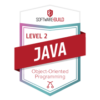
Section A. Intermediate (60 hours)
Gain a deeper understanding of types and libraries available. Read and write to the file system, query in-memory collections and format dates.
Section B. Advanced (60 hours)
Learn to develop applications with proper error-handling to avoid failure if something goes wrong. Topics include dependency injection for decoupling logical tiers and mocking for unit testing.
Section C. Mastery Project (120 hours)
Use your skills to create a Java application according to business requirements.
Java Badge Level 3 — Server-Side Web Development (two months-$2,000) ($1,750 with Level 2 badge completion discount)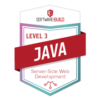
Section A. Consuming and Creating REST Web Services (60 hours)
Learn to host a RESTful web service using Spring Web MVC framework. Requirements include using Ajax functionality to make the jQuery library consume the web service.
Section B. Server-Side Programming (60 hours)
Test what you know about Spring Web MVC. Use the framework to create a website and validate form data per business rules.
Java Badge Level 4 — Full-Stack Web Development (three months-$3,000) ($2,500 with Level 3 badge completion discount)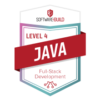
Section A. Database Basics (60 hours)
Acquire core skills for working with databases. Learn to create databases in MySQL and use tables to model database structures. This includes using constraints for referential integrity and SQL language for database queries.
Section B. Full-Stack Database Application (60 hours)
Learn to pull information from a database into a Java application. You will examine many popular frameworks, including Spring JdbcTemplate and Hibernate.
Section C. Capstone and Career Support (120 hours)
Now it’s time to show off your skills. Apply what you’ve learned to create a business-quality application from scratch. And faculty will prepare you for your job search with mock interviews, resume help and career counseling.
Request information and an enrollment counselor will be in touch to help.
TCU Office of Extended Education is partnering with The Software Guild to offer Coding Bootcamp.
